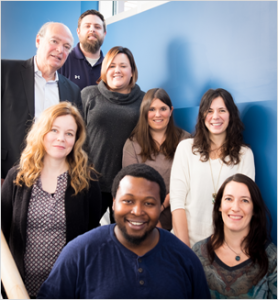
UConn Genomics Researcher awarded fellowship from CASCADE-FELLOWS
Dr. Maéva Langouët from the Department of Genetics and Genome Sciences in the UConn School of Medicine has been awarded the prestigious fellowship from the CASCADE-FELLOWS Program.
CASCADE-FELLOWS is an international fellowship program for talented young researchers in the Life Sciences, supported by the EU Marie Curie COFUND scheme and managed by the University of Nottingham. CASCADE-FELLOWS research projects last 12-24 months, during which time fellows benefit from mentorship and a structured training program to support their career development. This fellowship will be co-funded by the University of Nottingham, as the sponsoring organization, and the University of Connecticut Health Center, the host organization where Dr. Langouët will complete her work.
Dr. Langouët holds a PhD from the University of Paris Descartes, in France. Prior to joining UConn Health in 2014 as a postdoctoral fellow in Dr. Marc Lalande’s laboratory, she studied the genetics of intellectual disabilities at the Imagine Institute, Necker-Enfants Malades Hospital in Paris. Dr. Langouët’s CASCADE-FELLOWS award will support research on Prader-Willi syndrome (PWS), a neurogenetic disorder associated with cognitive and behavioral abnormalities including an eating disorder that can lead to obesity. PWS is also controlled by a biological process called genomic imprinting. Normally, people inherit a set of genes from each parent, and the phenomenon of genomic imprinting causes parent specific gene activation, whereby, in the case of chromosome 15, the genes inherited from the father are switched on while the same set of genes on the chromosome 15 inherited from the mother are switched off. In PWS, there is no normal copy of the paternal chromosome 15 so patients only have the switched off copies that came from the mother’s chromosome 15. The Lalande laboratory has identified an important component of the switch off mechanism, a protein called ZNF274. By destroying ZNF274 in stem cell lines created from PWS skin cells, Dr. Langouët, working closely with Heather Glatt-Deeley, has succeeded in switching on the set of genes in the maternal chromosome 15 in brain cells produced from ZNF274-less PWS stem cells. They are now testing new approaches for engineering ZNF274-less PWS stem cells and for interfering with ZNF274 binding in order to turn on the genes that are switched off in PWS without affecting the activity of other important genes. The overall goal of this research project is to better understand the pathophysiology of PWS and demonstrate that ZNF274 may be an appropriate molecular target for improving the symptoms of PWS.
“We are delighted Dr. Langouët’s research has been recognized and funded by the CASCADE-FELLOWS committee. We see this as an opportunity to further critical genomics research and simultaneously build our collaboration with the University of Nottingham, which manages the fellowship program,” noted Vice President for Global Affairs, Dr. Daniel Weiner.
The University of Nottingham is a part of the Universitas 21 global research network, which UConn joined in 2010. Since joining the network in 2010, UConn has cultivated a strong partnership with the University of Nottingham, which includes an undergraduate exchange relationship, preservice teacher internship program, and collaborative research on clean energy.